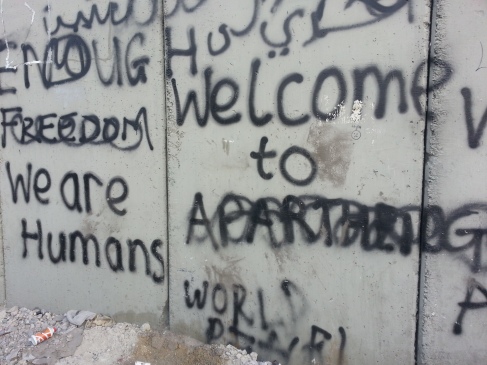As I sat in the sanctuary of Our Lady of Fatima Church in Beit Shour, a Roman Catholic Church in Palestine, I felt the presence of The Lord. I could not understand the Arabic language, I didn’t know what was being said in the liturgy, but I knew that God was there! I heard in my spirit a song by Martha Munizzi “God is Here”‘and I sung to myself. The lyrics: “I feel a sweet anointing in this sanctuary, I feel the Spirit in the atmosphere, come lay down the burdens you have carried for in this sanctuary God is here. He is here, He is here, to break the yokes and lift your heavy burdens, He is here, He is here, to heal the wounded hearts and bless the broken.” I have to imagine in the midst of this injustice, dispensed through an apartheid state that the people gather here to be living sanctuaries of hope. I have to imagine that as the song says that they that gather to hear The Lord speak. Their hope is in the risen Savior who carried our sins to the cross gives us hope in the midst of a fallen world. We can spend our time concentrating on the negative, being bitter, and angry, but the Word instructs us “to be quick to hear, slow to speak, slow to anger; for the anger of man does not produce God’s righteousness” (James 1:19-20). It is not to say that we should be passive and do nothing. Indeed, we live as human beings, but we do not wage war according to human standards; for the weapons of our warfare are not merely human, but they have divine power to destroy strongholds (2 Corinthians 10: 4) Our message and actions must reflect the ministry of hope and reconciliation. Psalm 34:15-17 says “the eyes of The Lord are on the righteous and His ears open to their cry. The face of The Lord is against evildoers, to cut off the remembrance of them from the earth. When the righteous cry for help, the Lord hears, and rescues them out of all their troubles. The Lord is near to the brokenhearted and saves the crushed in spirit.” Intercessory prayer, placing our trust in the sovereign Lord, is the first line of offense and defense ; it is the first response.
Being in that sanctuary brought me joy and gave me hope that trouble don’t last always. As I took holy communion my heart was joined with these believers. If I were at my church I would have been serving but it was nice to receive. I heard The Lord speak into my spirit, all are welcome at the His table, we are one in communion. After service we were warmly greeted and made welcome with Arabic coffee and small talk. I was struck by the community of believers, young and seasoned worshiping together being light was could be seen as a dark situation. I pray that our ministry of presence blessed them as much as I was blessed by encountering them.
— Beverly Moore


